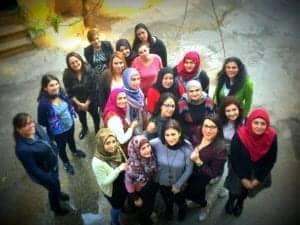What does it take to create a truly inclusive work environment for women? Commitment from the C-suite is one critical step, as are fair recruiting practices. A culture that supports all employees and holds itself accountable is also necessary. The winner of Women’s World Banking’s 2015 Excellence in Leadership Award has all of these and manages to achieve gender balance, even in a conservative culture.

“Non-discrimination and equal gender opportunity is at the very heart of Al Majmoua’s culture, core values and business principles,” says Dr. Youssef Fawaz, Executive Director of Al Majmoua. Several years ago, the institution committed to ensuring this is reflected in their employment practices by implementing a comprehensive set of policies across all levels of the organization towards attracting, developing, training, mentoring and retaining their next generation of women leaders.
The institution started with recruiting. They found innovative ways to ensure women were part of the hiring pool, for instance, by advertising entry-level positions to women entrepreneurs through SMS messages. They also established financial incentives for referring female employees. Equal treatment of men and women is emphasized throughout the recruitment, training, hiring and promotion phases, specifically in pay equity. Al Majmoua is not afraid of recruiting female employees who are in their early stage of pregnancy. The organization also considers the time and length of the trainings delivered to employees to ensure they do not interfere with home responsibilities.
Management supports work-life balance for all employees by offering flexible and remote working hours and support during family leave and maternity leave. Al Majmoua is also looking offer on-site child care for staff. Women’s World Banking knows from research that for women who are the primary caregivers for children or the elderly, these options can make career progression easier and is critical to building a pipeline of women poised for leadership positions. “Policies on part time and flexible hours allowed us to attract and retain top executives and for our younger staff the opportunity to pursue their education as well,” says Fawaz. Al Majmoua helps women further nurture their ambition by “removing the limitations they impose on themselves,” through coaching, mentoring and showcasing successful women leaders. Having more women into senior management positions is encouraging for women staff.
 Underlying all of this is a commitment by senior leadership: the executive director played a pivotal role in launching the gender diversity initiative, building consensus among the board and management team to support gender diversity as an asset to the corporation. Holding them accountable to that commitment are clear key performance indicators, such as:
Underlying all of this is a commitment by senior leadership: the executive director played a pivotal role in launching the gender diversity initiative, building consensus among the board and management team to support gender diversity as an asset to the corporation. Holding them accountable to that commitment are clear key performance indicators, such as:
- Proportion of women in each business unit, at each level and among new recruits
- Pay and attrition of men and women by function
While these practices are in line with the social mission of the organization, leadership also sees the initiative as a competitive advantage. “Al Majmoua has gained a lot by actively tapping the potential of women as we were able to foster our innovation and creativity and improve our customer orientation; [contributions by female staff helped us develop initiatives such as] launching a loan for female microentrepreneurs with no collateral required or distributing a shopping discount card for our female borrowers,” says Alia Farhat, Human Resources Manager of Al Majmoua
Al Majmoua strives to be a leader in Lebanon, which ranks near the bottom of the World Economic Forum’s Gender Gap Index (138 of 145 countries) overall and on women’s labor force participation. ”Women make up only 25 percent of the Lebanese workforce. They strive to confront gender discrimination in the workplace and usually leave the workforce earlier because of family pressure. It is unfortunate because the country’s economy is losing half of its talent, a thing we are not ready to give up at Al Majmoua” says Farhat. The institution is showing that even within this context, it is possible to create an organization that values women’s contributions, in an economy and within a company.
“We are proud of our women leaders,” says Fawaz. “Their contributions have shaped our institution’s achievements. Today, women represent 57% of total staff and 60% of the senior management team, and 56% of clients, and no woman employee in Al Majmoua needs to make a choice between professional success and work-life balance.” Is it any wonder Al Majmoua won the Excellence in Leadership Award?
The Excellence in Leadership Award annually honors institutions that (i) explicitly support internal gender diversity initiatives that give men and women employees equal opportunities to perform and excel, and (ii) develop the leadership and technical skills of their high potential women leaders.
Finalists for consideration for the Award are based on results of Women’s World Banking’s “Pledge and Practice” survey and established Network Performance Standards. Qualified institutions are invited to present an institutional gender diversity strategy or initiative for award consideration. Initiatives may range from innovative human resources policies that drive diversity and inclusion to specific programs or projects to promote gender diversity among staff.
Each institution’s initiative or strategy will be evaluated against the following criteria:
- Senior leadership commitment
- Link to organizational vision and objectives
- Accountability systems
- Internal and external communications
- Results (for existing initiatives) / Clarity of targets or objectives (for new initiatives)



